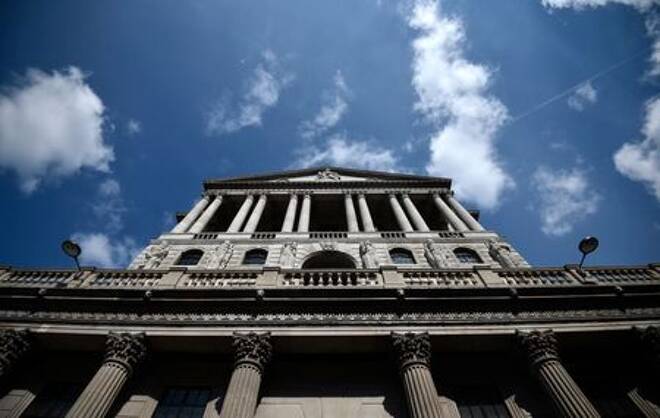Advertisement
Advertisement
Column: Rate trap? BoE and Sterling Snared by Rate Frenzy
By:
LONDON (Reuters) - If the Bank of England is bluffing on its rate raising plans, it increasingly risks triggering a trap door for sterling.
All central banks are at a tricky point, gradually accepting that ‘transient’ post-pandemic inflation will last longer than first thought as winter energy costs heat up and economies cool.
Whether fuel squeezes amplify a slowdown is a key point. But with longer-term inflation expectations building, market pressure on policymakers to wrest back control and retain credibility in their goals is mounting.
For many, this is fertile ground for policy mistakes.
Attempts to rein in credit and consumer demand to control what the International Monetary Fund and Organisation for Economic Cooperation and Development see as a temporary supply-side inflation shock may seem perverse.
Yet, a growing number of smaller central banks with strict inflation targets have already pulled the trigger, with the past week seeing New Zealand, Polish and Czech interest rate hikes.
The U.S. Federal Reserve and the European Central Bank are far from that, but both are preparing to either reduce, slow or recalibrate bond buying programmes. By contrast, the People’s Bank of China appears headed in the opposite direction and is already preparing to ease policy yet again.
The Bank of England appears caught in the middle and finds itself far ahead in the queue of G4 reserve currency countries most likely to raise rates first.
Thanks largely to its own rhetoric, the BoE encouraged markets to radically bring forward bets on the first UK interest rate rise to early 2022 even though governor Andrew Bailey admitted there was really nothing it could do to ease some of the more extreme supply problems.
But as European gas prices have soared, alongside partly Brexit-related trucker shortages and petrol supply problems, markets have gone ballistic. By some measures they now see as much as a 50-50 chance of a small hike in the 0.1% BoE policy rate by yearend – a full year before they are even thinking of an equivalent Fed move. [BOEWATCH]
Two-year gilt yields have almost doubled to 0.47% in the past month. UK 10-year inflation expectations embedded in the index-linked bond market added a third of a percentage point to highs above 3.9% over the same period and stand at levels seen only once fleetingly since the BoE was made independent in 1997.
While the latter is distorted at least a percentage point higher than more accepted consumer inflation gauges – as it’s still indexed to the outmoded retail price index – it nevertheless implies markets expect CPI inflation to persist far above the BoE’s 2% target for years to come.
What’s more, the BoE’s own survey of UK companies this week saw their 1-year ahead inflation view increase 30 bp to 3.5%.
And, unlike the Fed, the BoE has no new mandate for a more flexible averaging of that target over time.
TRAPDOOR FOR STERLING?
Yet the pound – measured by the BoE’s effective exchange rate index – has found little solace from the rate rise frenzy.
Sterling fell to its lowest in 7 months at one point last week as the outsize UK inflation scare sank relative real yields and investors feared an early rate hike would merely slow the economy more and lower the policy rate horizon further out.
Reports this week that UK households would face increases of more than 30% in winter energy bills underline that worry and make any parallel rise in loan and mortgage rates seem a brutal response bordering on overkill to many workers.
But there’s no easy choice. On the flip side, UK house prices rose at their fastest rate last month for almost 15 years despite the expiry of tax breaks.
Brooks Macdonald Chief Investment Officer Edward Park reckons the bond market moves look ‘scary’ but says “it’s important to distinguish between what the market really believes and what the pricing implies.”
Despite the volatility, the jury remains out on the extent of the inflation problem and the BoE’s likely response, he said.
Oxford Economics strategist Javier Corominas thinks that despite understandable concerns given the UK’s structural vulnerability to inflation over the past 50 years, it is time to “Sell the UK inflation scare”.
“The market has got ahead of itself in pricing in excessively high long-term inflation expectations,” he wrote. “At just 4% over the next decade, we see an opportunity to enter a short ten-year break-even inflation expectations trade.”
The problem for sterling is what happens if the BoE doesn’t now match the newly-aggressive rate expectations that it has helped stoke and starts to guide the market away from a potential year-end hike amid persistent inflation anxiety.
And if that lead to outsize sterling losses, how much would that compound the BoE’s task by spurring import prices?
New BoE Chief Economist Huw Pill did little to talk the market back from its forecasts on Thursday, stressing that “the magnitude and duration of the transient inflation spike is proving greater than expected.”
At the very least, there’s a delicate communications task ahead and the pound may now become hyper sensitive to every nuance.
For a look at all of today’s economic events, check out our economic calendar.
(By Mike Dolan, Twitter: @reutersMikeD; Editing by Alexander Smith)
About the Author
Reuterscontributor
Reuters, the news and media division of Thomson Reuters, is the world’s largest international multimedia news provider reaching more than one billion people every day. Reuters provides trusted business, financial, national, and international news to professionals via Thomson Reuters desktops, the world's media organizations, and directly to consumers at Reuters.com and via Reuters TV. Learn more about Thomson Reuters products:
Advertisement
